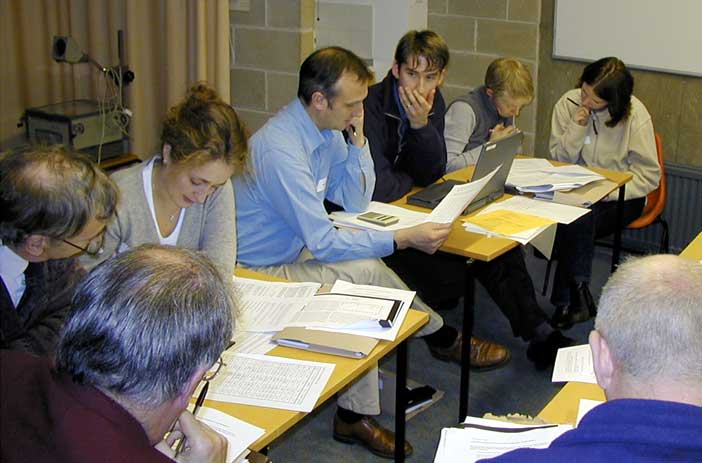
Who are Master Classes for?
TSN Master Classes are for teachers who would like to bring themselves up to date in particular scientific fields. Although this Master Class is designed primarily for high-school teachers of science, teachers of other subjects, or teachers in primary and middle schools who have a keen interest, may also apply.
Please remember that TSN Master Classes are not designed to supply classroom activities or curriculum packs that are necessarily suitable for children's use; they are to help update the teachers' own science base—which, in turn, should enable them to develop appropriate classroom materials.
Rather than addressing a specific topic in science as we have before, this Master Class looked at the different facets of scientific work: scientific styles, the political and ethical interfaces, and communication.
The afternoon practical sessions were genuine tasks whose outcomes were be used. For example, one group prepared a briefing document for the House of Commons, another reviewed a manuscript submitted to a scientific journal and advised its editor accordingly, while a third group prepared advice to be given to a large institution about its release of radioactive material.
Morning Sessions:
Prof. Peter Brimblecombe (ENV UEA) spoke about the scientific endeavour. Is there such a thing as the ‘scientific method’ that we try to teach in schools and, if there is, do scientists themselves stick to it? What do scientists really do? How do they actually work? What are the thinking processes that underpin their scientific approach? Are there a variety of ‘scientific methods’ and, if so, are they equally valid?
Prof. Tim Jickells (ENV UEA) talked about how scientists communicate with each other and with the rest of society. Who do scientists need to communicate with? How do they communicate with each other? Can scientists communicate with non-scientists effectively? Should they need to? Can science communication be genuinely international?
Dr. Michael Reiss (University of Cambridge) discussed whether or how scientists should involve themselves in the ethical issues concerning their science. Who should make the ethical decisions/judgements that are necessary? Is it possible to be both objective and ethical? Do value-judgements have any place in scientific research, or only in the application of science?
Dr. Gary Kass (Adviser to the Parliamentary Office of Science and Technology) considered the role of scientists in the political sphere. How does science play a part in decision-making at national and international levels? How do politicians interact with science? How can science be woven more intimately into society?
Afternoon Practical Sessions
Participants were able to choose from the following:
Refereeing for a scientific journal (led by Dr. Bill Sturgess ENV UEA). The Group had a genuine manuscript (on development of air pollution in Australia) to referee for the international journal ‘Atmospheric Environment’. By the end of the session the group produced a report that enabled the editor to decide whether or not to publish the article. The report also went to the author.
Preparing a briefing document for the House of Commons (led by Anne Ogden, COM UEA and Dr. Gary Kass OST). During the session this group prepared the material for briefing documents for the House of Commons on ‘Public Participation in Science and Technology Choice’.
Interpreting Data (led by Prof. Peter Brimblecombe, ENV UEA) The group interpreted genuine data on release of radioactive material and produce policy recommendations for the institution concerned.

The 'Radioactive Release' group at work in the afternoon session.